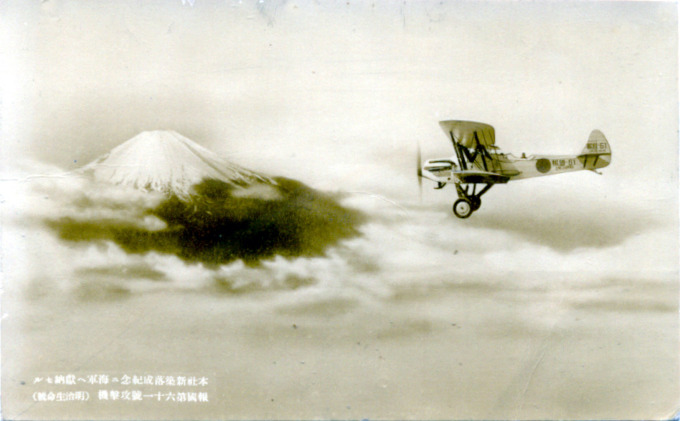“Spring, 1932. Yokosuka Naval Base, Tokyo Bay.
“Fuchida’s light gray two-seat Mitsubish B1M biplane roared over the glistening water unleashing its torpedo with a splash toward a barge marked with red flags. [He] directed his pilot to veer to the right, then tilt back left so he could look down just as a geyser exploded dead center on the barge. He smiled with satisfaction.
“… The Yokosuka Naval Base near Tokyo specialized in training pilots in bombing techniques of all methods, including horizontal, high-level bombing and dive bombing, but Fuchida focused on their specialty – torpedo bombing.”
– Wounded Tiger: A Nonfiction Novel, T. Martin Bennett, 2014
[Note: “Fuchida” is Fuchida Mitsuo, the captain of the Imperial Japanese Navy Air Service wing who led the first-wave attack on Pearl Harbor on December 7, 1941.]

A Mitsubishi B1M1 torpedo bomber biplane, c. 1925, flying over Mt. Fuji. What Mt. Rainier was to Boeing aircraft, Mt. Fuji was to Japanese aircraft manufacturers.
“While working with the Mitsubishi company, the British aircraft designer Herbert Smith (formerly of the Sopwith aircraft company) designed Japan’s first torpedo bomber, the two-seat B1M biplane, which flew for the first time in January 1923.
“The type replaced the Imperial Japanese Navy’s Glouchestershire Sparrowhawks, entering service in 1924 and serving as the IJN principal attack and reconnaissance aircraft into the 1930s, with 32 flying from the aircraft carriers Kaga and Hōshō during the Shanghai Incident in 1932.
“Later models added a third crew member and an extended range of 400 miles. Total production was 443.”
– Wikipedia


Pingback: Mitsubishi 1MT, c. 1922. | Old Tokyo
Pingback: Imperial Japanese Navy aircraft carrier “Akagi”, c. 1930. | Old Tokyo